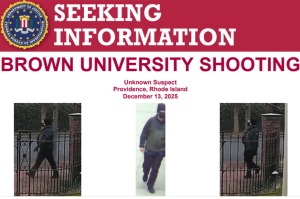Is California Headed for a 'Big One'?
Southern California was hit by a 5.4-magnitude earthquake Tuesday that rattled nerves and got people thinking about how much more prepared they need to be before the "Big One" that scientists have long feared finally hits.
The quake, which caused only limited damage and minor injuries, rocked the region from Los Angeles to San Diego and served as a reminder of the invisible seismic danger lurking beneath the ground.
But as strong a jolt as it was, Tuesday's quake had only about one percent of the energy of the deadly magnitude-6.7 Northridge earthquake that toppled bridges and buildings in 1994, experts say.
Still, the less powerful quake was strong enough to hit headlines across the nation and get Californians vowing to step up their emergency preparations.
"People have forgotten, I think, what earthquakes feel like," Caltech seismologist Kate Hutton told The Associated Press. "So I think we should probably look at it as an earthquake drill."
Tuesday's temblor certainly mobilized a number of Californians to take a closer look at how they've set up their environments, prompting many to secure free-standing bookshelves, begin stocking up on non-perishable foods, or check on the availability of flashlights, candles, and radios in their homes.
What spurred less action was news just two weeks earlier that nearly one in four public high school students in California dropped out in the 2006-07 school year.
Should it have?
Also, on the same day that the quake hit, the Los Angeles City Council voted unanimously on a one-year ban on new fast-food restaurants in a poor neighborhood of the city battling higher-than-average obesity.
The ban was approved at a time when governments of all levels are increasingly viewing menus as a matter of public health. Last Friday, California became the first state in the nation to bar trans fats, which lowers levels of good cholesterol and increases bad cholesterol.
The quake and fast-food ban also comes one week after the Los Angeles City Council decided to outlaw plastic bags in two years to minimize cleanup costs for the city and reduce trash that collects in storm drains and the Los Angeles River.
So …? How are all these seemingly unrelated news items tied together?
Well, when it comes to protecting the physical health of its citizens and its patch of the earth, the people of California are pioneers.
Now, imagine if Californians did the opposite – voting against a moratorium for new fast-food restaurants, allowing trans fats to be readily available, and allowing plastic bags that could be a threat to the environment.
Liberal lawmakers and activists would likely shudder at the thought. Why? Because they feel such bans are necessary and can potentially protect the health of the people and the health of the planet. And there's nothing wrong with that.
What's wrong, however, is the fact that a large number of Californians are failing to see that the society it hopes to make healthier is in jeopardy because of unseen cancers – harmful agents that are being opposed by weak efforts, no efforts, or even garnering support.
Without much difficulty, many can see the relationship between fast-food, trans-fat, and obesity – whether through scientific findings or personal belief or observation. Also observable is a relationship between recycling and pollution.
But what many Californians are failing to see is the relationship between the breakdown of family values and the persistence of society's cancers – crime, divorce, etc.
That may explain why nearly half of Californians support same-sex "marriage," for example. Marriage, to many, has become simply an institution about two individuals - not about the families that are to be built through them. This applies both to homosexual individuals as well as heterosexual individuals. And marriage is something that can be easily tossed away, as evident in the one-in-two marriages that end in divorce.
And while there are not yet solid conclusions on why drop-out rates in California public schools are so high, it's almost certainly going to be tied with weak family households among other related factors.
Sadly enough, the relationship between a healthy society and the value placed on family escapes many in California. And because it's out of sight, it's out of mind.
So even moderate-to-strong shocks – such as the recent drop-out rate findings – are not enough to get California urgently moving to strengthen family values.
What does get Californians moving, however, are jolts like Tuesday's quake, which follows calculations by scientists earlier this year stating that California faces a 99.7 percent chance of a magnitude-6.7 quake or larger in the next 30 years.
But isn't there something more serious hitting the state?
If California does not make bigger strides to tackle these "value" matters as urgently as it does obesity, pollution, and earthquakes, it will find itself having to face the very difficult task of repairing the damage caused by the "Big One" that will strike from a break in society's foundation.



























